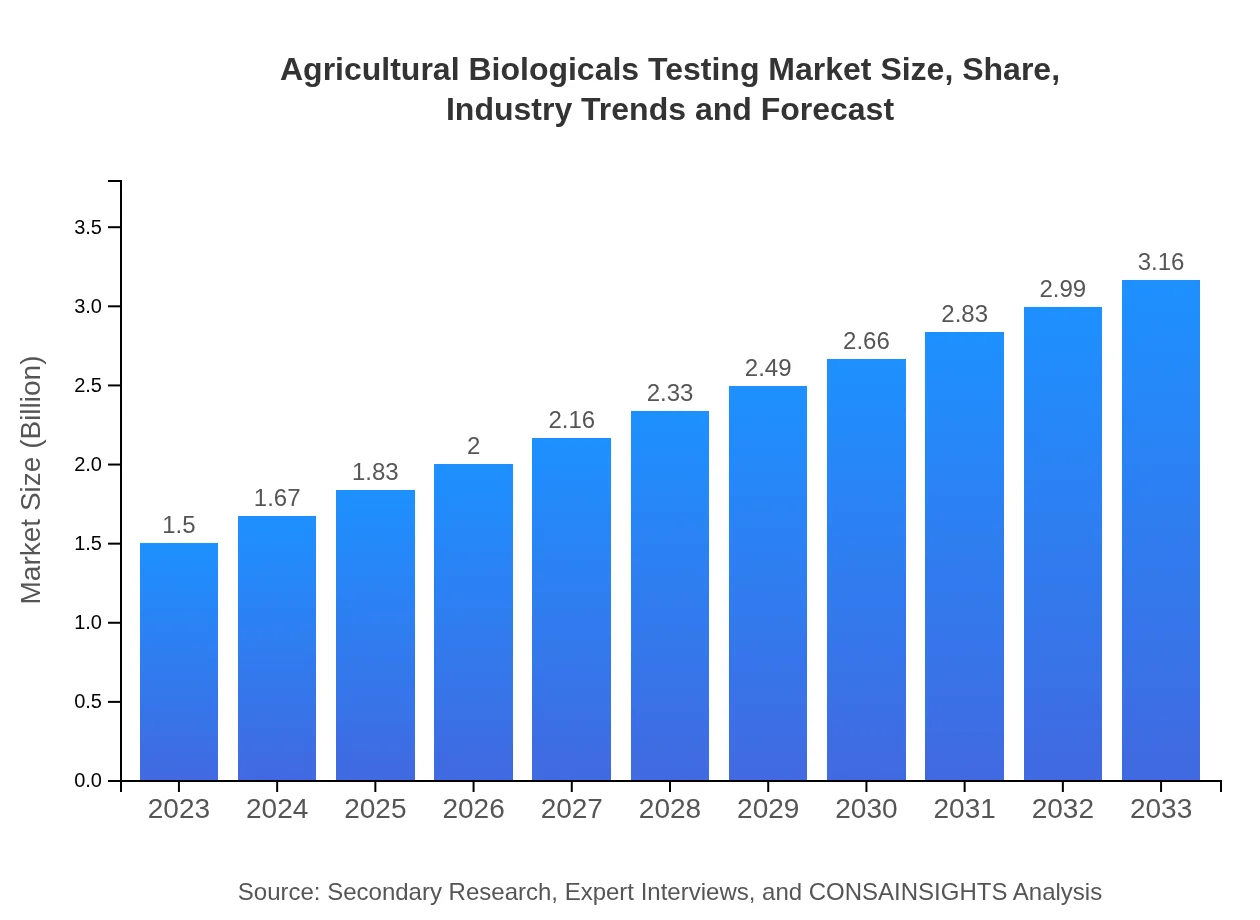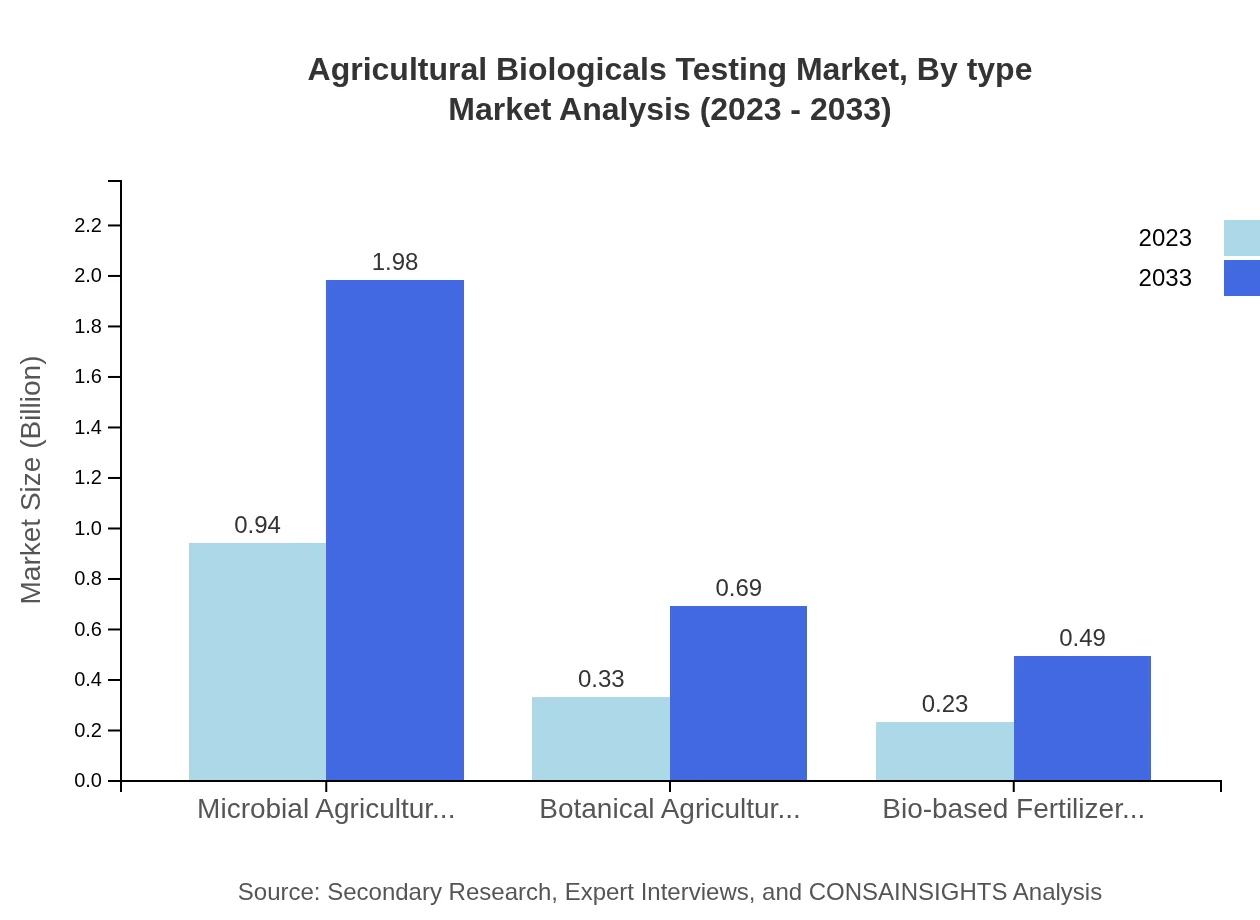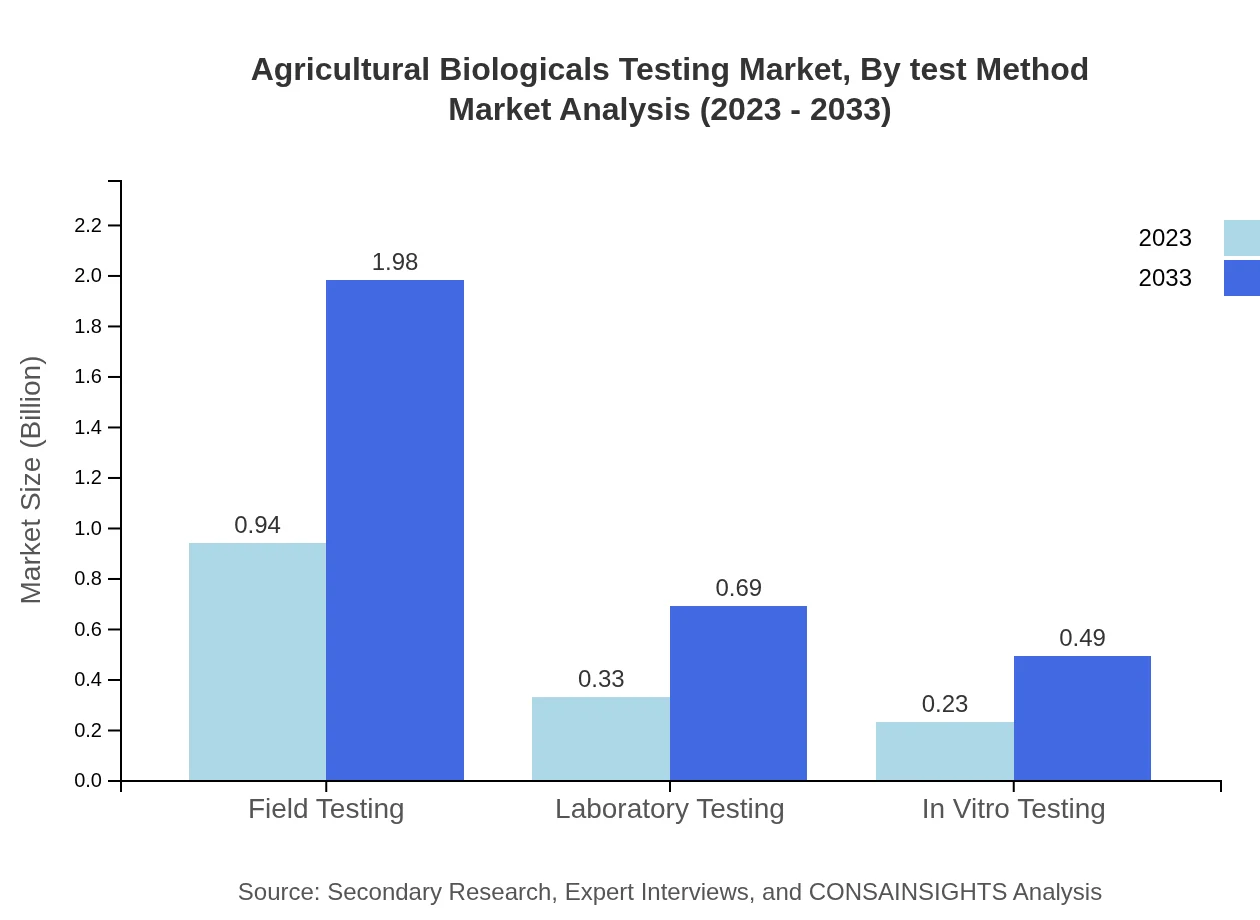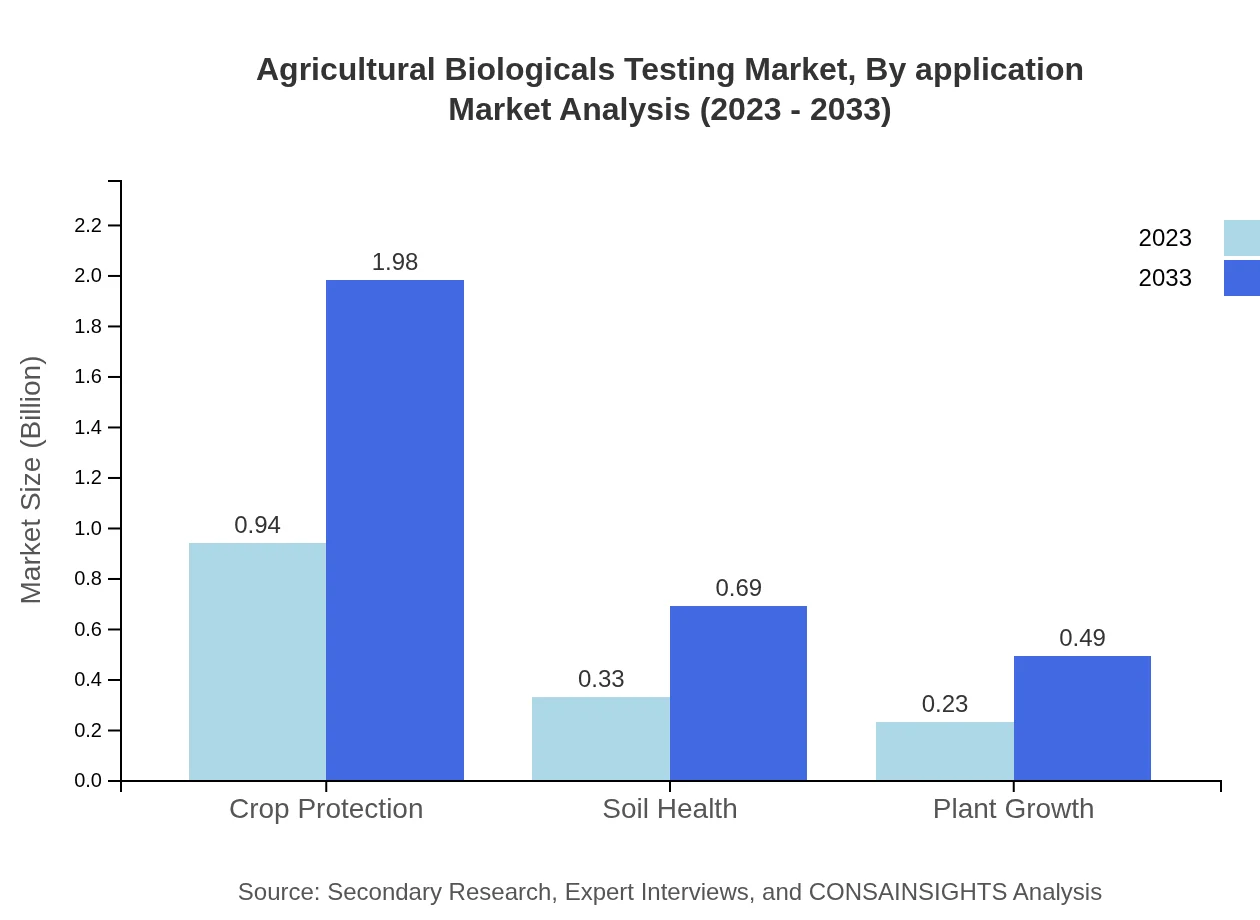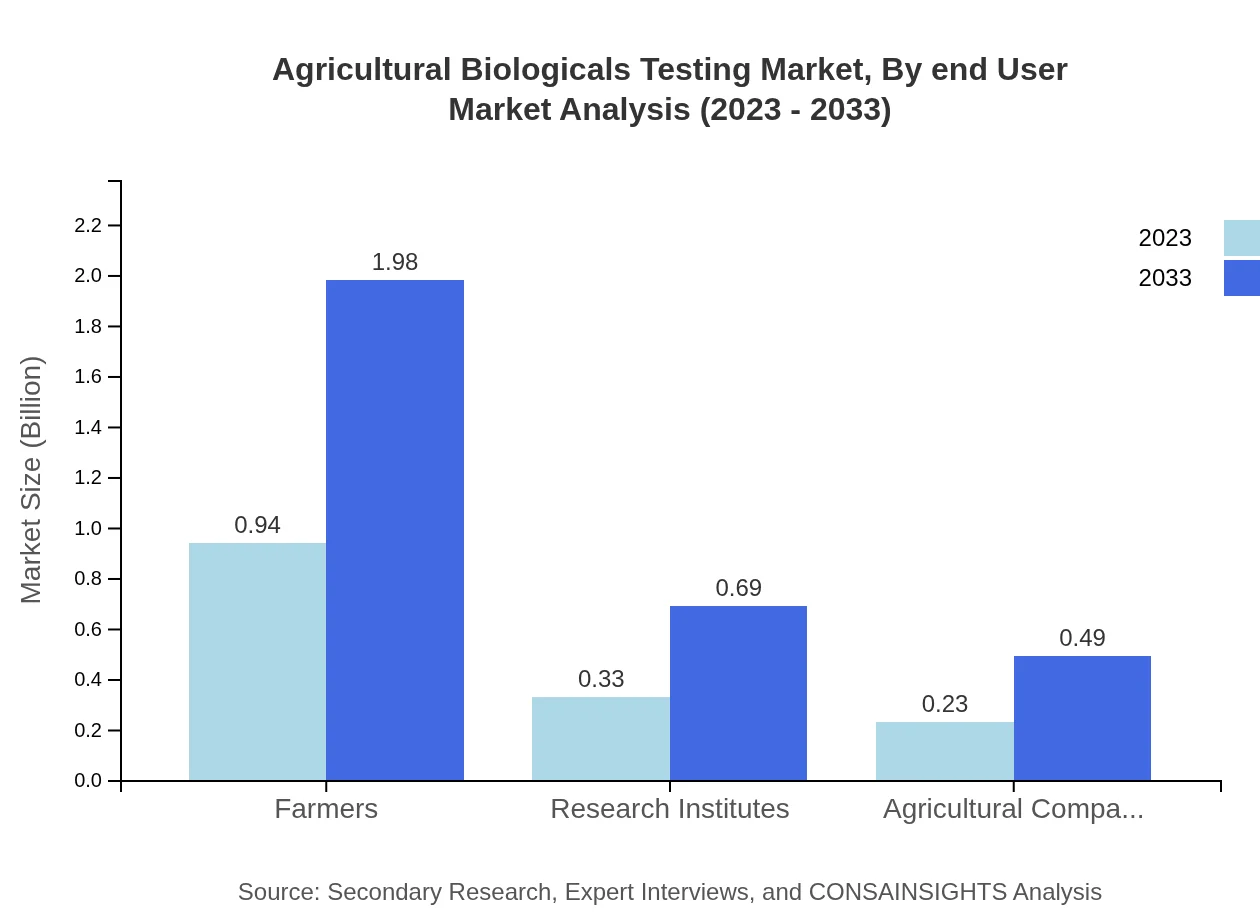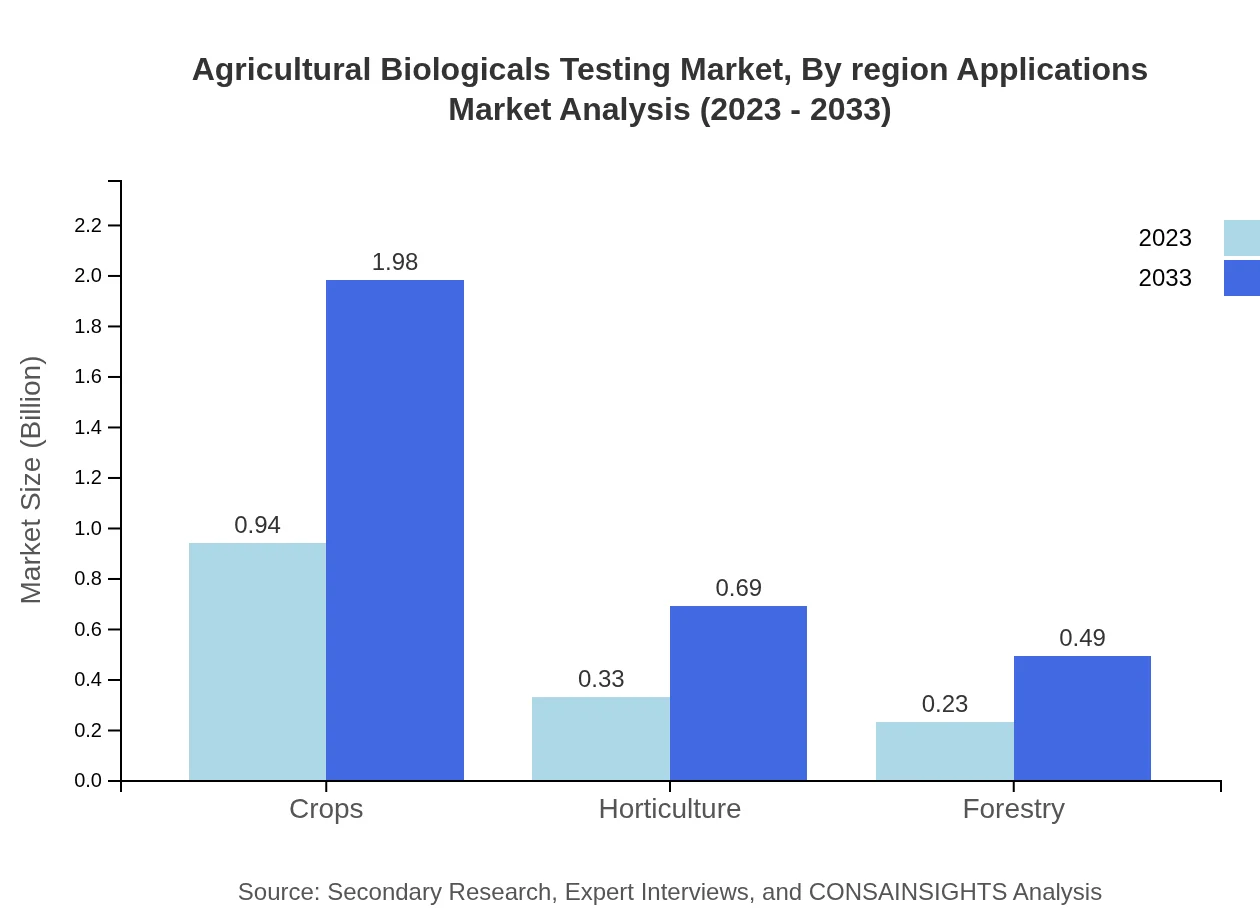Agricultural Biologicals Testing Market Report
Published Date: 31 January 2026 | Report Code: agricultural-biologicals-testing
Agricultural Biologicals Testing Market Size, Share, Industry Trends and Forecast to 2033
This report provides a comprehensive analysis of the Agricultural Biologicals Testing market, covering market size, trends, segments, and regional insights. The focus spans from 2023 to 2033, presenting forecasts and strategic insights vital for industry stakeholders.
| Metric | Value |
|---|---|
| Study Period | 2023 - 2033 |
| 2023 Market Size | $1.50 Billion |
| CAGR (2023-2033) | 7.5% |
| 2033 Market Size | $3.16 Billion |
| Top Companies | BASF, Syngenta, FMC Corporation, Dow AgroSciences |
| Last Modified Date | 31 January 2026 |
Agricultural Biologicals Testing Market Overview
Customize Agricultural Biologicals Testing Market Report market research report
- ✔ Get in-depth analysis of Agricultural Biologicals Testing market size, growth, and forecasts.
- ✔ Understand Agricultural Biologicals Testing's regional dynamics and industry-specific trends.
- ✔ Identify potential applications, end-user demand, and growth segments in Agricultural Biologicals Testing
What is the Market Size & CAGR of Agricultural Biologicals Testing market in 2023?
Agricultural Biologicals Testing Industry Analysis
Agricultural Biologicals Testing Market Segmentation and Scope
Tell us your focus area and get a customized research report.
Agricultural Biologicals Testing Market Analysis Report by Region
Europe Agricultural Biologicals Testing Market Report:
The European Agricultural Biologicals Testing market is expected to increase from $0.40 billion in 2023 to $0.84 billion by 2033. The European Union's stringent regulations regarding agricultural practices and the emphasis on sustainability drive advancements in testing techniques. Countries such as Germany and France are at the forefront of this market, adopting comprehensive testing protocols to align with environmental goals.Asia Pacific Agricultural Biologicals Testing Market Report:
In the Asia Pacific region, the Agricultural Biologicals Testing market is projected to grow from $0.29 billion in 2023 to $0.61 billion by 2033. The growth is driven by the increasing adoption of organic farming practices, regulatory compliance demands, and investment in innovative agricultural solutions. Countries like India and China are leading the charge with strong government support for sustainable practices and heightened environmental awareness among consumers.North America Agricultural Biologicals Testing Market Report:
North America represents a significant share of the Agricultural Biologicals Testing market, projected to grow from $0.56 billion in 2023 to $1.19 billion by 2033. The United States and Canada are prominent in adopting innovative biological products, further supported by strict regulatory frameworks in place for agricultural inputs. The increasing consumer preference for organic products fuels the demand for rigorous testing methods.South America Agricultural Biologicals Testing Market Report:
The South American market for Agricultural Biologicals Testing is expected to expand from $0.11 billion in 2023 to $0.22 billion by 2033. Brazil and Argentina are the primary players in this market, focusing on boosting agricultural productivity through biological methods and ensuring compliance with international trade standards on produce safety. The rising trend of sustainable farming practices in this region significantly contributes to this growth.Middle East & Africa Agricultural Biologicals Testing Market Report:
The Middle East and Africa market for Agricultural Biologicals Testing is anticipated to grow from $0.14 billion in 2023 to $0.30 billion by 2033. The agricultural sector in this region faces challenges such as water scarcity and soil degradation, prompting a shift towards sustainable agricultural practices. The demand for effective biological inputs is on the rise, bolstered by governmental support and increased awareness of sustainable farming.Tell us your focus area and get a customized research report.
Agricultural Biologicals Testing Market Analysis By Type
The Agricultural Biologicals Testing market by type segment shows strong performance with Microbial Agricultural Biologicals leading the charge, expected to grow from $0.94 billion in 2023 to $1.98 billion by 2033. It accounts for 62.6% of the market share. Other notable segments include Botanical Agricultural Biologicals, which are anticipated to rise from $0.33 billion to $0.69 billion, and Bio-based Fertilizers and Nutrients, expected to grow from $0.23 billion to $0.49 billion by 2033, representing 21.93% and 15.47% market shares, respectively.
Agricultural Biologicals Testing Market Analysis By Test Method
Testing methods heavily influence the Agricultural Biologicals Testing market. Field Testing holds a significant share, expected to grow from $0.94 billion in 2023 to $1.98 billion by 2033, maintaining 62.6% market share. Laboratory Testing is also important, growing from $0.33 billion to $0.69 billion. In Vitro Testing is projected to rise from $0.23 billion to $0.49 billion, showcasing a trend towards more efficient testing protocols.
Agricultural Biologicals Testing Market Analysis By Application
The Agricultural Biologicals Testing market by application indicates robust growth across various domains. The crop segment is expected to see significant growth, increasing from $0.94 billion to $1.98 billion. Other applications such as Horticulture and Forestry are vital, showing gradual growth and importance, accounting for shares of 21.93% and 15.47% respectively.
Agricultural Biologicals Testing Market Analysis By End User
In terms of end-users, Farmers dominate the Agricultural Biologicals Testing market, expected to rise from $0.94 billion in 2023 to $1.98 billion by 2033, accounting for 62.6% market share. Research Institutes and Agricultural Companies hold significant positions, growing from $0.33 billion to $0.69 billion and from $0.23 billion to $0.49 billion respectively.
Agricultural Biologicals Testing Market Analysis By Region Applications
The Agricultural Biologicals Testing market varies regionally, with North America and Europe exhibiting growth potential driven by regulatory demands and consumer preferences towards organic products. Asia Pacific shows a rising trend as sustainable practices gain traction. South America and the Middle East face unique challenges yet present growth opportunities as investment in sustainable methods increases.
Agricultural Biologicals Testing Market Trends and Future Forecast
Tell us your focus area and get a customized research report.
Global Market Leaders and Top Companies in Agricultural Biologicals Testing Industry
BASF:
A leading chemical company, BASF is heavily invested in agricultural solutions, providing comprehensive testing services and innovative biological products for sustainable agriculture.Syngenta:
Syngenta focuses on agricultural innovations, offering a range of biological products and testing services aimed at enhancing crop production while adhering to environmental sustainability.FMC Corporation:
FMC Corporation is known for its wide portfolio of agricultural solutions, including biological testing, that addresses pest and weed management while promoting safe practices.Dow AgroSciences:
Dow AgroSciences integrates biotechnology into its offerings, providing testing protocols that ensure the effectiveness of biological agricultural products.We're grateful to work with incredible clients.









FAQs
What is the market size of agricultural Biologicals Testing?
In 2023, the agricultural biologicals testing market is valued at approximately $1.5 billion, with a projected compound annual growth rate (CAGR) of 7.5% through 2033, indicating substantial growth in this sector.
What are the key market players or companies in this agricultural Biologicals Testing industry?
Key players in the agricultural biologicals testing industry typically include large agricultural firms, biotech companies, and specialized testing laboratories. These organizations drive innovation and quality assurance for biological products in agriculture.
What are the primary factors driving the growth in the agricultural Biologicals Testing industry?
Factors driving growth include increased demand for sustainable agriculture, regulatory compliance needs, advancements in testing technologies, and heightened awareness of environmental impacts resulting from agricultural practices.
Which region is the fastest Growing in the agricultural Biologicals Testing?
North America represents the fastest-growing region, with market size expanding from $0.56 billion in 2023 to an estimated $1.19 billion by 2033, highlighting a significant investment in agricultural biologicals testing.
Does ConsaInsights provide customized market report data for the agricultural Biologicals Testing industry?
Yes, ConsaInsights offers customized market report data tailored to specific client requirements. This includes in-depth insights into market trends, competitive analysis, and forecasts essential for decision-making.
What deliverables can I expect from this agricultural Biologicals Testing market research project?
Deliverables include comprehensive market reports, analytics dashboards, competitor profiles, segmentation analysis, and actionable recommendations based on the latest trends and insights in the agricultural biologicals testing market.
What are the market trends of agricultural Biologicals Testing?
Key trends include increased research in biopesticides, adoption of microbial solutions, rise in demand for sustainability in farming, and technological advancements in testing methodologies to ensure product efficacy and safety.

